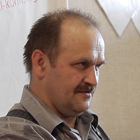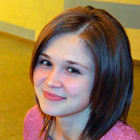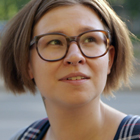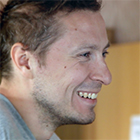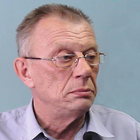KHRC Memorial
Helps the victims of police violence and inspects prisons
Memorial was founded in 1989, but our human rights commission was opened a bit later. When the Syktyvkar branch was shut down, we already had our own internal structure and we became a separate organization. The particular swallowed the whole. There was no transition period, it just happened so that, in 1996, human rights organization began to appear across the country. We also had an idea and wanted to help people. And we created Memorial, Komi Human Rights Commission (KHRC), jumping on the bandwagon.
I joined the organization, while researching the history of my family, and my archival work was also related to the excursions I was taking my students to, while collecting people’s stories and memories. Back then, Mikhail Rogachev was responsible for this kind of work in the Syktyvkar branch. Then he continued this work in Repentance Foundation.
We started assisting inmates, who were beaten up at police stations; and we still keep on doing this today.
The civil society group Syktyvkar-Bus grew out of VK.com social network. We came out into the streets and observed whether bus companies were keeping the timetables and whether the services they provided were of sufficient quality. The results of our work were published as a small booklet, which we have recently presented to the transportation companies, and the representatives of the mayor’s office, the Ministry of Transport, and the trade unions. At the moment, we still do not have a full-fledged communication with the authorities, but we hope that the situation will change.
Every third bus in Syktyvkar is violating the schedule. Schedule charts located at bus stops are filled in incorrectly. Some bus stops have neither seating spaces, not rain caps.
It even becomes funny sometimes. Recently, a new bus stop was ceremonially opened in the village called Kortkeros. This bus stop was a slab of concrete lying by the side of the road. There was a scandal, and activists managed to attract the attention of mass media.
Frankly speaking, we have a lot of work ahead of us, before we can make a real difference.
Motivation is the most important thing here. That is, a person should not only receive an instrument of solving the problems of the weak despite the pressure from the strong, but he or she should also believe that this is possible, that, if one really knuckles down, it may actually work. Seminars on values – this is about “bethinking oneself,” this is about self-confidence, confidence in one’s friends and in like-minded people.
As a rule, we try to use interactive learning technologies. We try to design seminars in such a way that its participants do not write things down, but feel themselves involved in the training, feel the need to discuss their values. Undoubtedly, I mean the values of humanism, of the human beings as such, the values of human rights, etc. More often than not, we conduct seminars using exercises that we have tried ourselves and which worked for us. We share our experience with other people, so that they could do something to protect their own rights and to protect the weak.
According to the decree on the access of human rights defenders to police stations, our names should have been in the lists, which were sent around by the Moscow Helsinki Group. Yet, this year, we could not send them the documents on time, therefore, police officers did not really understand who we were, despite the fact that we coordinated our visits with the Komi Rebublic branch of the Ministry of Internal Affairs and submitted a separate notification on behalf of KHRC Memorial.
It should be also possible to perform such checkups without notifications, but we had negative experience last year. When my colleague and I conducted such a checkup for the first time, no one knew us. Police officers very tensely told us about their stands located at the station and answered a couple of questions. In Oktyabrskoye police station they did not even talk or listen to us, we could only photograph their stands. In Ezhva they just kicked us out, saying that they had a day off and that the management was away and that they did not know anything. They also added, “Get out of here on your own; otherwise we will help you out.” We had to leave, because we were not interested in starting a conflict, we just wanted to do the checkup.
Actually, Memorial is holding a lot of seminars: on the civil control of police work, on the problems of inmates, and on monitoring issues. Yet, in the countryside people are mostly interested in everyday life – in what they encounter day by day in the streets, at work, in the shop, and in the village community center. And this is usually within the responsibility of state officials. The seminar in Izhma was precisely about this – how to influence the authorities.
I really like to communicate with people at the seminars that take place in the region. At that moment – and I am only speaking for myself – I usually look at the problems and issues that people really care about in a different light. This helps me improve my self-confidence, believe in my goals again. The theory we are teaching gets support from practice. And one begins to understand certain things in more depth.
Yet, the most important thing is to sit down and talk, and to listen to those people. This is important both for us and for them. We are looking for kindred spirits, if I may say so; we are looking for those who care. And we are trying to help each other, support each other and we are moving forward together.
People write us almost every day and come to see us; they are looking for their relatives. If the organization closes down, we will continue working on this project on our own. Maybe we will get a presidential grant. If not, we will use the project of the general Gulag archive that we were making together with Memorial.
You see, if they shut us down, the rest of the work will be also suspended. I mean expeditions, seminars, exhibitions, and the work with the youth.
Civil society organization should understand that grant support must be minimal. A big share of the work should be done by volunteers; this is what employees need to understand. Only in this case the organization will be independent and long-lived. One should not bait people and turn the organization into a source of income. Volunteering is the foundation of any human rights organization and its only future. And grants – whether they come from within the state or from some international foundations – should be used for only a small part of what the organization is doing.
The members of our board are not getting salaries. In addition, they also pay significant membership fees. The same is true for all other members of Memorial. Every board meeting is a discussion of how to protect human rights in a better way and whether it is possible to find additional money for prison inspections, for instance, it is a discussion on how our membership fees are spent.
